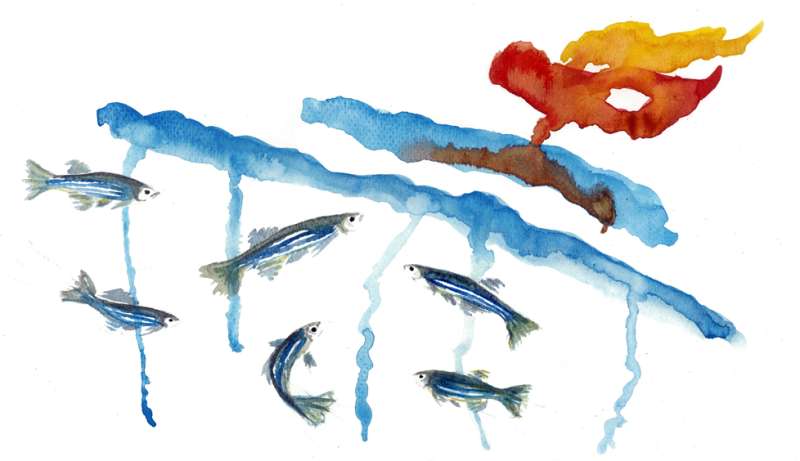Social support in zebrafish. Credit: Rodrigo Abril de Abreu
According to a new study led by Rui Oliveira, researcher at ISPA - Instituto Universitário, Instituto Gulbenkian de Ciência, and Fundação Champalimaud, zebrafish need social support to overcome adverse circumstances and may, therefore, become a model of choice for studying this behavior and its underlying neural mechanisms.
The discoveries of this study, published in Scientific Reports, open new avenues for understanding this social behavior, crucial for human well-being and of great relevance in certain diseases such as depression or generalized anxiety.
The support that each individual receives from the immediate social environment influences behavior and can help the individual to surpass setbacks. Besides humans, other social animals are better able to recover from an adverse situation in the presence of their peers. In this study, the authors sought to identify the neural mechanisms that underlie the social support phenomenon in zebrafish. This animal model, increasingly used in medical research and behavioral neuroscience, offers a wide variety of well-established techniques that allowed the detailed study of the neural mechanisms of this behavior.
The first experiments developed by the research team showed that zebrafish exhibit less fear in a threatening situation when they can see and smell their shoal than when they are alone, revealing the presence of the social support phenomenon in this species.
The investigators then tried to determine which of the cues, visual or olfactory, had more impact in minimizing the response of fear in a threatening situation. The results revealed that the visualization of a shoal is more effective in decreasing fear response when in a prolonged exposure to the threat, and that the efficacy of social support, in these situations, does not depend on shoal size.
The study also showed that the social support phenomenon in zebrafish triggers a specific pattern of activation in several brain areas (pre-optic area, amygdala) that are also involved in the same phenomenon in mammals. These similarities between the activated brain areas suggest zebrafish as an ideal model organism for research on social support, since it may reproduce neural mechanisms that also exist in humans.
As the first author of this study, Ana Faustino, states: "Although zebrafish´s social support does not have the complexity of the social support verified in humans, research in zebrafish will allow us to explore in depth the neural mechanisms involved in this social behavior, which is paramount to the well-being and mental health of the human species, particularly due to its relevance to certain psychological diseases such as depression."
More information: Scientific Reports, DOI: 10.1038/srep44329
Journal information: Scientific Reports
Provided by Instituto Gulbenkian de Ciencia























